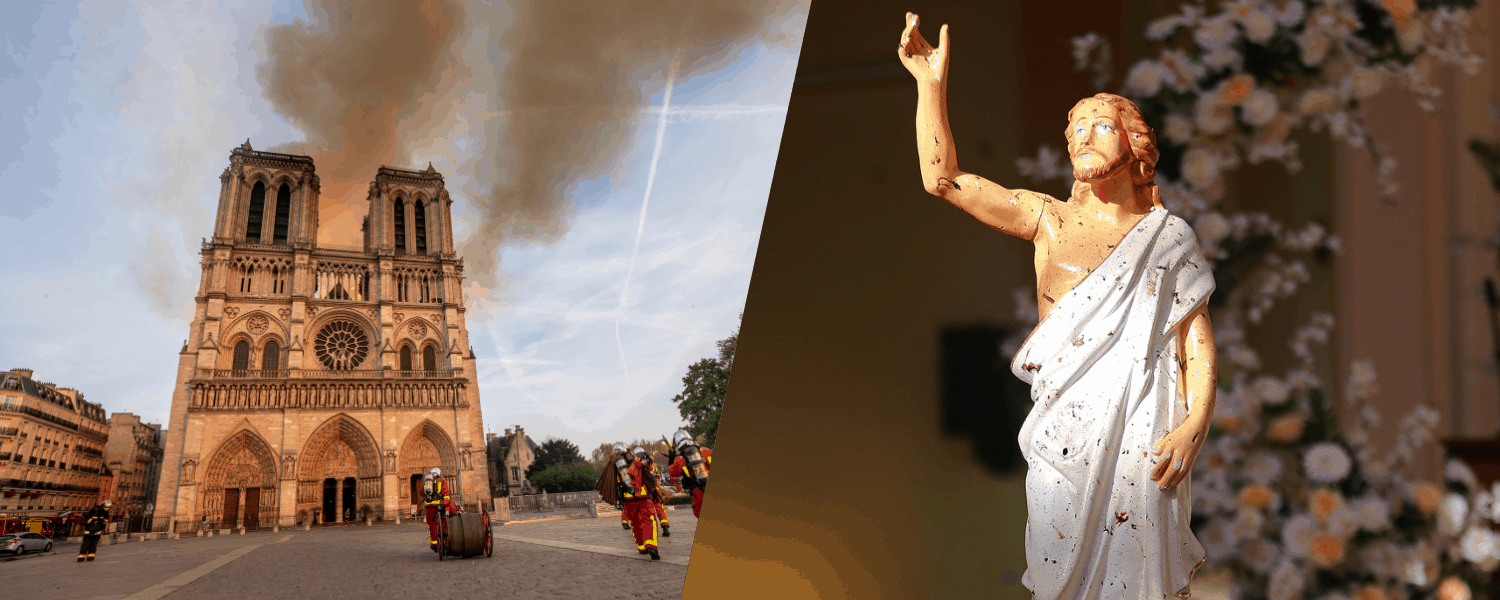The New York Times vividly described the mix of innocence and violence in their coverage of this past weekend’s tragedy: “As Christians in Sri Lanka gathered on Sunday morning to celebrate Easter Mass, powerful explosions ripped through three churches packed with worshipers, leaving hundreds of victims amid a havoc of splintered and blood-spattered pews.”
The carnage gives perspective to the fire that nearly consumed all of Notre-Dame, where no lives were lost, not even the Blessed Sacrament. A catastrophic accident at the beginning of last week, which robbed Western Civilization of one of its proudest achievements, now seems much smaller in comparison to over 300 people losing their lives in Sri Lanka.
With the fire, a symbol was lost. These types of losses provoke questions that have to do with meaning. It mirrors what happens to someone when they lose the faith of their childhood. A part of their history has been dissolved. If it ever comes back, it won’t be the same. Notre Dame was a Cathedral as well as a center for the city of Paris, a symbol of French identity, and, of course, a breathtakingly beautiful site for tourists in the world’s most visited city. It’s a lot of different things to a lot of people. Hence, why there’s been a lot of polemic around what’s worth a billion dollar investment.
But in contrast with the fire that scorched the French church, the tragedy at Sri Lanka will more than likely stir less heated argument. Here’s the reason: there’s nothing left for us to recover. There’s no discussion about how to recover life when it’s irretrievably lost. Death disambiguates the site of human redemption in a way that losing a Cathedral, however beautiful, never will.
To elaborate, consider this passage from a piece in the Atlantic: “But Notre-Dame also occupies a space beyond architecture or faith, a space in which buildings seem to represent the human capacity for endurance….The fire on Monday was a catastrophe. What happens next has the potential to remind France—and the world—that extraordinary feats and recoveries are still possible.” This type of encomium has placed human excellence as its site of redemption. It speaks to how any tourists can hope for Notre-Dame’s reconstruction without centering that hope in God. One can bemoan the fire merely out of sheer respect for beauty and culture.
With Sri Lanka, there is no hope for redemption of the loss outside of Christ.
One image circulating around social media captures just that. Left standing was a statue of the Risen Lord, smeared with the blood of the faithful in one of the targeted churches. The picture communicates how something was lost that can never be rebuilt or reconstructed or recovered, only redeemed. And redeemed in the fullest sense. Something much more beautiful than Notre Dame was lost in Sri Lanka: his very body, the poor in spirit who gathered to pray to Jesus and to celebrate his Resurrection, to eat his flesh and drink his blood in the Mass, the core of Catholic life. Recalling St. Lawrence, these people—humble, prayerful, the pure of heart and the persecuted who Jesus exalted in the beatitudes—are the true riches of the Church.
A calculated bombing of Christians on their holiest day is a recapitulation of what they gathered to celebrate: how their Savior let himself be violently murdered, and then rose—the wounds still on his body. Bloodshed is what we celebrate during Holy Week. As Fr. Cantalamessa pointed out at the Vatican’s Good Friday service, because Christ crucified represents the part of humanity that is “humiliated and insulted,” the Paschal mystery directs itself in a special way to the persecuted, saying, “you have a right to claim him as yours.” So, too, for those affected by Sunday’s events.
No billionaire or public policy option has anything of worth to offer the victims. Not really. Only Jesus does. Only “the Author of life, whom God raised from the dead.” (Acts 3:15). The loss of life leaves Easter as the only promise of any significance.


